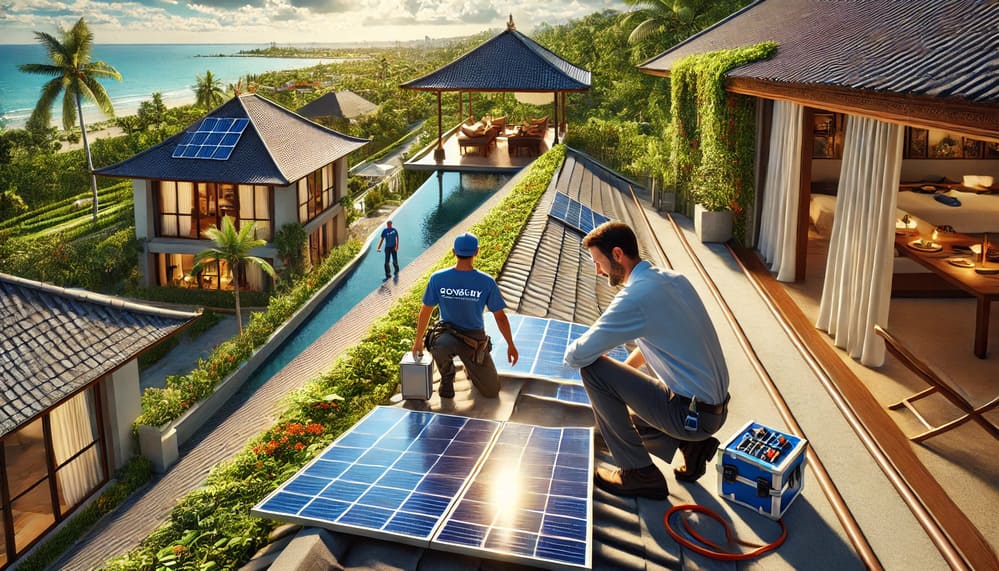Bali sebagai salah satu destinasi wisata paling populer di dunia semakin tertekan untuk menjaga keindahan alamnya sambil mendukung industri perhotelan yang terus berkembang. Keberlanjutan kini bukan cuma tren, tapi jadi kebutuhan untuk bisnis, terutama hotel, yang pengen bertahan di pasar. Dengan menerapkan praktik berkelanjutan dalam operasional mereka, hotel nggak cuma bisa ngurangin dampak lingkungan, tapi juga menarik lebih banyak wisatawan yang peduli lingkungan. Di blog ini, kita bakal bahas pentingnya keberlanjutan di sektor perhotelan Bali dan gimana hotel bisa menerapkan praktik ramah lingkungan seperti desain hemat energi, penghematan air, dan manajemen sampah. Kita juga akan jelasin gimana Noethera Studio bisa bantu hotel untuk beralih ke praktik-praktik ini.
Pentingnya Keberlanjutan di Industri Perhotelan Bali
Alam Bali yang hijau dan pantai yang indah adalah daya tarik utama buat turis. Tapi, pertumbuhan cepat industri perhotelan bikin lingkungan di Bali jadi terancam. Overdevelopment, peningkatan sampah, dan konsumsi sumber daya yang berlebihan jadi masalah yang makin besar, baik untuk warga lokal maupun turis. Untuk mengatasi ini, banyak hotel mulai beralih ke operasional yang lebih ramah lingkungan, sadar bahwa keberhasilan bisnis mereka bergantung pada kelestarian sumber daya yang jadi daya tarik wisatawan.
Selain itu, keberlanjutan juga makin jadi faktor penting bagi wisatawan saat milih tempat nginep. Banyak turis sekarang lebih memilih hotel yang peduli sama lingkungan, dan mereka siap mendukung hotel yang berusaha mengurangi jejak ekologis mereka. Ini jadi peluang unik buat hotel-hotel di Bali buat tampil beda dengan menerapkan praktik berkelanjutan dan mempromosikan komitmen mereka terhadap lingkungan.
Desain Hemat Energi: Kurangi Penggunaan, Tambah Penghematan
Salah satu cara paling efektif buat meningkatkan keberlanjutan adalah dengan adopsi desain hemat energi. Konsumsi energi adalah biaya operasional terbesar buat hotel, terutama di iklim tropis kayak Bali, di mana AC dan pencahayaan digunakan secara intensif. Dengan mengintegrasikan teknologi hemat energi dan elemen desain, hotel bisa ngurangin penggunaan energi sambil tetap menjaga kenyamanan tamu.
Misalnya, pasang panel surya bisa jadi sumber energi terbarukan yang mengurangi ketergantungan pada listrik konvensional. Sistem pencahayaan hemat energi seperti lampu LED nggak cuma konsumsi listriknya lebih sedikit, tapi juga tahan lama, jadi nggak perlu sering-sering ganti. Ditambah lagi, teknik pendinginan pasif—seperti ventilasi alami, atap reflektif, dan elemen peneduh—bisa bantu menjaga suhu dalam ruangan tetap nyaman tanpa bergantung penuh pada AC.
Di Noethera Studio, kita bantu hotel buat evaluasi konsumsi energi mereka dan nyari strategi terbaik buat ngurangin. Dari rekomendasi teknologi hemat energi sampai bantuin implementasi desain berkelanjutan, layanan konsultasi kami memastikan hotel bisa beralih ke operasional yang lebih ramah lingkungan sambil tetap menjaga kenyamanan tamu.
Penghematan Air: Jaga Sumber Daya Berharga Bali
Kekurangan air adalah masalah yang terus-menerus terjadi di Bali, terutama selama musim kemarau. Hotel, sebagai salah satu konsumen air terbesar, punya tanggung jawab buat menerapkan langkah-langkah penghematan air untuk membantu melindungi sumber daya ini. Ada strategi simpel tapi efektif yang bisa bikin perbedaan besar dalam pengurangan penggunaan air tanpa mengorbankan pengalaman tamu.
Shower head, keran, dan toilet dengan aliran air rendah bisa banget ngurangin penggunaan air di kamar tamu. Selain itu, sistem penampungan air hujan bisa dipakai buat kebutuhan air non-potable seperti penyiraman taman atau pembersihan. Hotel juga bisa edukasi tamu soal penghematan air dengan ngajak mereka buat pakai handuk dan seprai lebih dari sekali, jadi nggak perlu sering-sering dicuci.
Pengelolaan lanskap juga bisa ngurangin konsumsi air. Dengan menanam tanaman asli atau yang tahan kekeringan, hotel bisa tetap punya taman indah tanpa butuh banyak air. Sistem irigasi yang efisien, kayak irigasi tetes, juga bisa pastiin tanaman cuma dapet air yang mereka butuhin, tanpa pemborosan.
Noethera Studio punya keahlian dalam solusi manajemen air khusus buat sektor perhotelan. Kita bantu hotel buat evaluasi penggunaan air mereka saat ini dan mengembangkan strategi penghematan air yang sesuai dengan tujuan lingkungan dan kepuasan tamu.
Manajemen Sampah: Kurangi Sampah dan Tingkatkan Daur Ulang
Manajemen sampah adalah bagian penting dari operasional hotel yang berkelanjutan, terutama di Bali, di mana infrastruktur pengelolaan sampah terbatas. Menerapkan program pengurangan sampah dan daur ulang yang efektif bisa bantu hotel ngurangin dampak lingkungan mereka sekaligus menciptakan lingkungan yang lebih bersih dan menarik buat tamu.
Hotel bisa mulai dengan ngurangin penggunaan plastik sekali pakai, yang jadi kontributor sampah terbesar. Ganti produk seperti dispenser isi ulang untuk perlengkapan mandi, sediakan botol minum ulang-alik untuk tamu, dan hilangkan sedotan plastik bisa jadi langkah kecil yang berdampak besar. Selain itu, bikin program daur ulang yang komprehensif bakal memastikan bahan-bahan seperti kertas, kaca, dan logam dibuang dengan benar dan nggak berakhir di tempat pembuangan akhir.
Sampah organik seperti sisa makanan bisa dikomposkan daripada dibuang ke tempat sampah. Kompos nggak cuma ngurangin sampah, tapi juga bikin tanah yang kaya nutrisi yang bisa dipakai buat taman hotel. Hotel juga bisa kerja sama dengan pemasok lokal buat ngurangin limbah kemasan dan prioritasin produk yang bersumber secara berkelanjutan.
Noethera Studio bantu hotel buat implementasi strategi manajemen sampah yang ngurangin produksi sampah dan ningkatin usaha daur ulang. Tim kami kasih rekomendasi yang sesuai biar hotel bisa adopsi praktik yang selaras dengan tujuan lingkungan sekaligus efisien secara operasional.
Gimana Noethera Studio Bisa Bantu Hotel Implementasi Praktik Berkelanjutan
Berpindah ke operasional yang berkelanjutan mungkin keliatan rumit, terutama buat hotel yang udah sibuk dengan operasional sehari-hari. Tapi, dengan panduan yang tepat, proses ini bisa berjalan mulus, hemat biaya, dan sangat menguntungkan.
Di Noethera Studio, kami spesialis dalam membantu hotel menavigasi kompleksitas keberlanjutan. Tim kami kerja sama erat dengan pemilik dan manajer hotel buat ngembangin strategi keberlanjutan yang disesuaikan dengan kebutuhan dan tujuan properti. Mulai dari audit energi sampai bikin rencana manajemen sampah, kami kasih alat dan keahlian yang diperlukan buat bikin keberlanjutan jadi bagian inti dari operasional hotel.
Dengan bekerja sama dengan Noethera Studio, hotel nggak cuma bisa ngurangin dampak lingkungan mereka, tapi juga menarik wisatawan yang peduli lingkungan, ningkatin kepuasan tamu, dan ngurangin biaya operasional. Keberlanjutan adalah masa depan industri perhotelan, dan kami siap bantu hotel buat embrace masa depan itu.
Kesimpulan
Keberlanjutan sekarang bukan lagi pilihan di sektor perhotelan Bali—ini adalah keharusan buat melindungi sumber daya alam pulau, memenuhi kebutuhan wisatawan yang peduli lingkungan, dan menjaga profitabilitas jangka panjang. Dengan adopsi desain hemat energi, menerapkan langkah penghematan air, dan memperbaiki manajemen sampah, hotel bisa meningkatkan operasional mereka sambil berkontribusi pada masa depan yang lebih berkelanjutan untuk Bali.
Noethera Studio berkomitmen membantu hotel mencapai tujuan keberlanjutan mereka. Layanan konsultasi kami kasih panduan dan dukungan yang dibutuhkan buat implementasi praktik ramah lingkungan yang efektif, yang menguntungkan lingkungan dan bisnis kamu.







